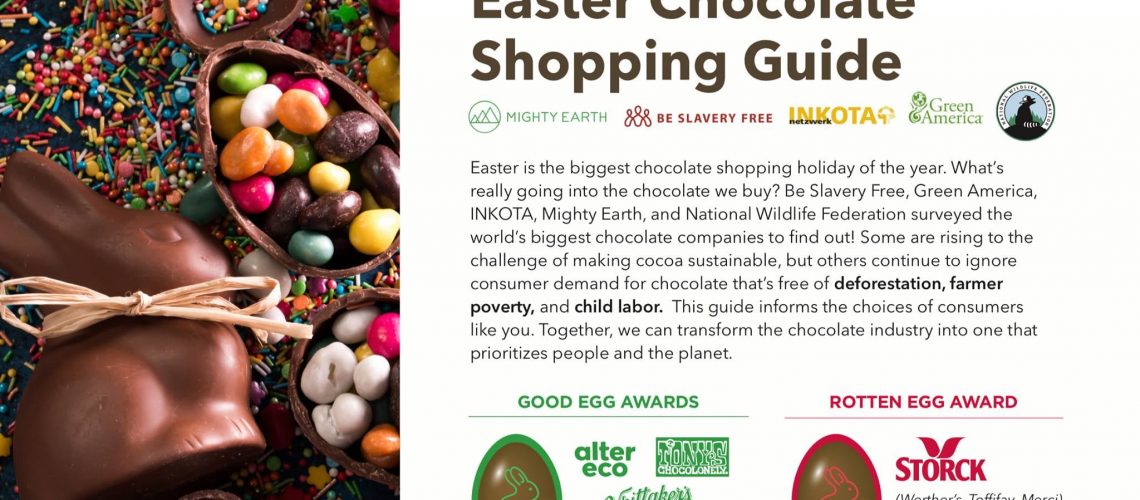EcoCare Ghana has held a press conference to launch the Easter Chocolate Scorecard 2021 in Ghana on behalf of Mighty Earth to promote sustainability in the cocoa value chain. The annual scorecard which was put together by Mighty Earth, Be Slavery Free, Green America, INKOTA-netzwerk and National Wildlife Federation (USA) surveyed the world’s biggest chocolate companies on how they are tackling key sustainability challenges in the cocoa industry such as child labour, deforestation and low income for farmers.
The Easter Scorecard also serves as Easter Chocolate Shopping Guide for consumers to identify and buy from companies “who are working towards the elimination of exploitation and unethical practices from their supply chains.
The 2021 Easter scorecard, which was launched in Washington D.C., USA, therefore, ranked and graded chocolate companies on key sustainability issues with the “Good Egg” award going to the three highest-ranking companies. The Good Egg Award for 2021 was given to New Zealand chocolate brand Whittaker’s”.
At the Ghana launch in Accra, Mr Obed Owusu-Addai, the Managing Campaigner of EcoCare Ghana, a local Non-Governmental Organisation, said in collaboration with the Ghana Civil Society Cocoa Platform (GCCP), his outfit decided to localise the issues raised in the Easter Scorecard abroad and situate them within the context of current cocoa conversations in the country.
He said the launch of the Scorecard would help assess the activities of chocolate processing companies against indicators that were relevant to the ordinary cocoa farmer in the country.
“In the context of Ghana, we are looking at what measures these companies are putting in place in their corporate documents to ensure that their footprints do not lead to further deforestation, child labour and supporting the improvement of the livelihood to local producers through the payment of the Living Income Differential. “Especially around this Easter where a lot of people around the world eat a lot of chocolate, we also wanted to show Ghanaians what the footprints of those who buy our cocoa beans and processes it into chocolate bars in Europe and America were” he stated.
Mr Samuel Mawutor, Senior Advisor, Mighty Earth, a Global Environmental Campaign Organisation based in the USA, explained that Mighty Earth partnered with Green America, INKOTA, National Wildlife Federation, and Be Slavery Free in Australia and The Netherlands to develop a survey to assess chocolate producing companies on some pressing and vital sustainability issues facing the chocolate industry.
The companies selected ranged from the largest cocoa traders and chocolate manufacturers in the industry to smaller innovative ones.
Mr Mawutor said some major companies, which were approached to participate in the survey, turned down the invite, adding that non-participation was viewed as a lack of transparency.
“We believe that all companies selling chocolate products should be able to provide the information we are asking for, and consumers have a right to know about the conditions under, which the chocolate is produced,” he said.
“Some very high-performing companies only sell in certain geographies, and we wanted consumers to always have the realistic option of going out and buying chocolate from a ‘good egg’ winner.”
“We sadly gave a ‘rotten egg’ award to a company that was not only unresponsive to our questionnaire but also had a demonstrated problematic track record of poor performance on cocoa sustainability”.
Mr Mawutor said previous scorecards ranked and graded companies based on their public support for due diligence regulation but this year’s went a step further, with the scores depending on the extent to which the company implemented the different elements of human rights and due diligence.
These elements are human rights policy statements and internal due diligence processes; comprehensive risk assessment, which is publicly available, and measures to prevent and mitigate all relevant human rights violation risks in the cocoa supply chain, while reviewing and reporting on the impact of these measures.
“If a company does not know where their cocoa comes from, they cannot ensure it is not tainted by child labour, deforestation, or other abuses. Without transparency on traceability, civil society cannot hold companies accountable. Transparent traceability is crucial as a bedrock for all other reforms,” he said.






